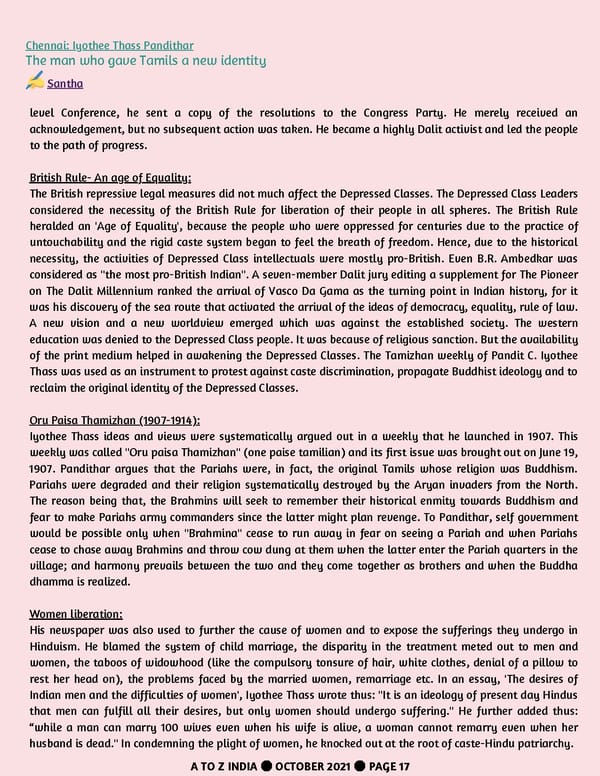Chennai: Iyothee Thass Pandithar The man who gave Tamils a new identity Santha level Conference, he sent a copy of the resolutions to the Congress Party. He merely received an acknowledgement, but no subsequent action was taken. He became a highly Dalit activist and led the people to the path of progress. British Rule- An age of Equality: The British repressive legal measures did not much affect the Depressed Classes. The Depressed Class Leaders considered the necessity of the British Rule for liberation of their people in all spheres. The British Rule heralded an 'Age of Equality', because the people who were oppressed for centuries due to the practice of untouchability and the rigid caste system began to feel the breath of freedom. Hence, due to the historical necessity, the activities of Depressed Class intellectuals were mostly pro-British. Even B.R. Ambedkar was considered as "the most pro-British Indian". A seven-member Dalit jury editing a supplement for The Pioneer on The Dalit Millennium ranked the arrival of Vasco Da Gama as the turning point in Indian history, for it was his discovery of the sea route that activated the arrival of the ideas of democracy, equality, rule of law. A new vision and a new worldview emerged which was against the established society. The western education was denied to the Depressed Class people. It was because of religious sanction. But the availability of the print medium helped in awakening the Depressed Classes. The Tamizhan weekly of Pandit C. Iyothee Thass was used as an instrument to protest against caste discrimination, propagate Buddhist ideology and to reclaim the original identity of the Depressed Classes. Oru Paisa Thamizhan (1907-1914): Iyothee Thass ideas and views were systematically argued out in a weekly that he launched in 1907. This weekly was called "Oru paisa Thamizhan" (one paise tamilian) and its first issue was brought out on June 19, 1907. Pandithar argues that the Pariahs were, in fact, the original Tamils whose religion was Buddhism. Pariahs were degraded and their religion systematically destroyed by the Aryan invaders from the North. The reason being that, the Brahmins will seek to remember their historical enmity towards Buddhism and fear to make Pariahs army commanders since the latter might plan revenge. To Pandithar, self government would be possible only when "Brahmina" cease to run away in fear on seeing a Pariah and when Pariahs cease to chase away Brahmins and throw cow dung at them when the latter enter the Pariah quarters in the village; and harmony prevails between the two and they come together as brothers and when the Buddha dhamma is realized. Women liberation: His newspaper was also used to further the cause of women and to expose the sufferings they undergo in Hinduism. He blamed the system of child marriage, the disparity in the treatment meted out to men and women, the taboos of widowhood (like the compulsory tonsure of hair, white clothes, denial of a pillow to rest her head on), the problems faced by the married women, remarriage etc. In an essay, 'The desires of Indian men and the difficulties of women', Iyothee Thass wrote thus: "It is an ideology of present day Hindus that men can fulfill all their desires, but only women should undergo suffering." He further added thus: “while a man can marry 100 wives even when his wife is alive, a woman cannot remarry even when her husband is dead." In condemning the plight of women, he knocked out at the root of caste-Hindu patriarchy. A TO Z INDIA ● OCTOBER 2021 ● PAGE 17
 A TO Z INDIA - OCTOBER 21 Page 16 Page 18
A TO Z INDIA - OCTOBER 21 Page 16 Page 18